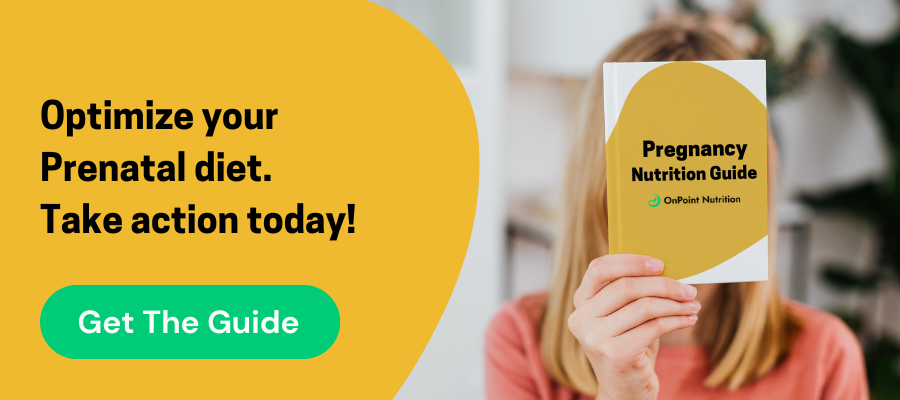
Nausea and vomiting are common during the first trimester of pregnancy. At least half of pregnant women experience these symptoms. Most often, nausea sets in during weeks 6 to 12 of pregnancy, which is caused by rapidly changing hormone levels. These symptoms are commonly called morning sickness, which is an unfortunately misleading description. Many women find themselves nauseous sporadically throughout the day, or even all day long.
Nausea can make it challenging to eat all the nutrients you and your growing baby need each day. You may not feel like eating or may struggle to keep down what you do eat. Additionally, many women also feel fatigued during the first trimester, which makes planning meals, grocery shopping, and cooking more challenging. Some women also report a heightened sense of smell, paired with food aversions that make cooking even less appealing.
Unfortunately, there is no magic pill to make the nausea go away. However, there are strategies that help you and your baby get the nutrients you need.
Eat More Often
While eating may seem like the last thing that you want to do, many women find that nausea is worse when their stomach is completely empty. Eating small, frequent meals and snacks may help to minimize your nausea. Additionally, eating something small first thing in the morning, even before getting out of bed, may directly help with morning nausea. Some women choose to keep a small, dry, carbohydrate snack beside their bed to eat before rising in the morning. Getting up slowly may also help decrease morning nausea.
Stick to Starches
Carbohydrates and starchy foods are the best-tolerated foods during early pregnancy. Carbohydrates are easy for the body to digest and give you quick energy when you need it most. Popular starchy carbohydrates include crackers, toast, bagels, oatmeal, dry cereals, plain pasta, pretzels, and popcorn.
Nighttime Snack
Some women find that eating a snack before bed may alleviate nausea that presents overnight or early in the morning. A high-protein snack may be helpful to balance your blood sugar over night. If you enjoy it, yogurt is a great high-protein bedtime snack.
Separate Solids
Some women find that eating food and drinking liquids at the same time makes nausea worse. Hydration is key during pregnancy, so drinking water in between meals and snacks may be helpful. Ideally, wait 20-30 minutes between eating and drinking to avoid triggering nausea. The general guideline for pregnant women is to consume at least 80 ounces of water daily, but it is best to discuss your individual needs with your doctor or dietitian.
Cold Foods
During the first trimester, some women find that cold foods are easier to stomach than warm foods. This is likely because colder foods have less strong scents, which many pregnant women are also sensitive to.
Foods to Try
Eggs contain protein and choline, which are both important for your baby’s growth and development. Cooking eggs all the way through is important to prevent foodborne illness (link foods to avoid blog). Cooked and cooled hard-boiled eggs are a great way to get some protein throughout the day.
Similarly, cooked and cooled chicken can be used in a sandwich or wrap. You can also put chicken onto a salad if cool, crisp vegetables sound appealing. Cool, fresh fruit is easy for some women to tolerate as well. Be sure to wash any produce you consume thoroughly before consuming. If you’re feeling up for it, a fruit smoothie is another good way to get a healthy dose of the beneficial nutrients you and your baby need.
Vitamin B6 has may also reduce nausea and vomiting during pregnancy. While it may be a challenge to stomach some of these foods, try incorporating chicken, fish, tofu, chickpeas, potatoes, bananas, and fortified cereal into your diet as you are able. Your prenatal vitamin likely contains vitamin B6 as well.
During days or times that you are feeling better, try to expand your palette. Try your best to consume a variety of fruits, vegetables, complex carbohydrates, lean proteins, and healthy fats as tolerated.
Foods to Avoid
- High fat foods such as fried foods and foods with heavy sauces are often not well-tolerated because they are harder for your body to digest
- High acid foods and drinks like citrus and tomato products may make nausea worse
- Spicy foods may cause heartburn, which may also make things worse
- Gas producing foods including beans and cruciferous vegetables can cause gastrointestinal distress and contribute to the problem
- Caffeine, coffee specifically, may also aggravate the symptoms you are experiencing. Although some caffeine is believed to be safe, you may feel better eliminating it all together (link to foods to avoid for pregnancy blog)
Potential Remedies
- Ginger is often used as a remedy for nausea. Grating fresh ginger and steeping in hot water like tea is a common way to alleviate nausea
- Some women find that sipping water with a small amount of lemon is helpful
- Getting fresh air by sitting outside or going for a walk may also help you find relief from your nausea
Personalized Planning
Every pregnancy is different. You may experience different symptoms and different triggers than friends or family members. You may even experience different symptoms during different pregnancies of your own. One of the most beneficial things you can do is to learn your own triggers. Pay close attention to which foods make you feel good, and which foods make you feel sick. It may also help to keep a journal of what foods you are eating and what symptoms you are experiencing
If you are struggling to find an eating pattern that makes you feel good during your pregnancy our team is here to help.

Topics

Liz has been reading nutrition labels since she learned how to read. Growing up with severe peanut and tree nut allergies she learned that it’s important to know what you are putting into your body. She made her first big lifestyle change as a freshman in high school, when she decided to become a vegetarian. However, it wasn’t until she took a food class in Italy as part of a study abroad program in college that it clicked in her mind that she wanted to make food and nutrition her career. Liz graduated from Penn State University in 2015 with a bachelor's degree in Nutrition, as well as a bachelor's degree in Marketing. She completed her dietetic internship with Aramark in Philadelphia, and her master's degree at Northeastern University shortly after.




